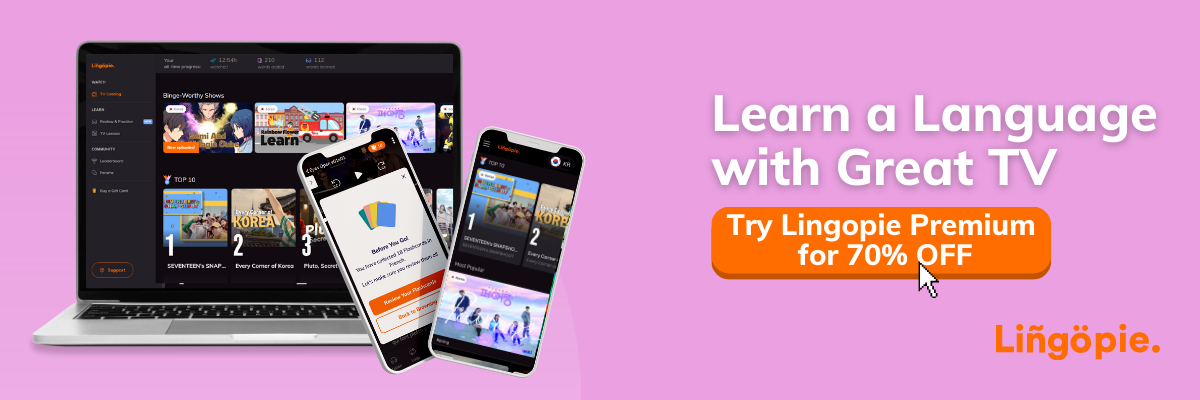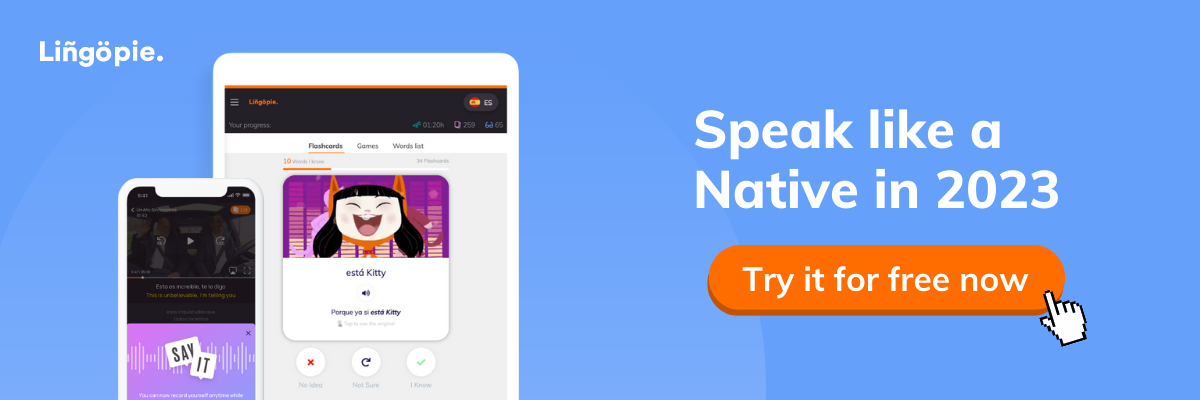Are you looking for an exciting and unconventional way to learn German? Look no further than the popular German TV series, How to Sell Drugs Online (Fast).
This gripping show presents a unique opportunity to immerse yourself in the German language and culture. From vocabulary building to improving grammar and pronunciation, we'll provide practical tips and techniques to enhance your German skills.
We will also discuss the Lingopie's Language Learning with Netflix extension that provides extra language practice for learners. So, get ready to dive into the world of How to Sell Drugs Online (Fast) and unlock your German language potential.

Table of Contents:
- Introducing How to Sell Drugs Online (Fast)
- The Benefits of Learning German with Netflix
- Techniques for Language Learners
- Learn Expressions from How to Sell Drugs Online (Fast)
- Language Learning with Netflix: Lingopie Extension
- Other German Language-Learning Tools
- FAQs About Learning German with Netflix
- Summing Up: Learn German with How to Sell Drugs Online (Fast)
Introducing How to Sell Drugs Online (Fast)
How to Sell Drugs Online (Fast) is a German TV series that follows the story of high school student Moritz Zimmermann, who, after a breakup, launches an online drug empire with his friend Lenny. The show combines dark humor, teenage drama, and fast-paced storytelling.
The series has gained significant popularity and critical acclaim since its release. It has been praised for its engaging plot, relatable characters, and sharp dialogue.
As a language learning tool, How to Sell Drugs Online (Fast) provides an immersive experience in authentic German dialogue. Its contemporary setting and colloquial language make it a relevant resource for learners looking to improve their comprehension and conversational skills.
Through its engaging storylines and diverse characters, the series offers an exciting opportunity for language learners to explore German culture and enhance their language proficiency.
The Benefits of Learning German with Netflix
Using TV shows as a language learning tool offers numerous advantages for German learners. Firstly, it allows for exposure to authentic German dialogue, helping you develop a natural ear for the language.
Immersion in the spoken language through TV shows provides valuable practice in listening comprehension and trains your brain to process German in real-life contexts. This is the Lingopie methodology. Check out Lingopie's recommendations for German TV shows and movies for learners.
Additionally, TV shows offer a glimpse into German culture, providing a cultural context that enhances language acquisition. Understanding the cultural nuances embedded in the language enriches your understanding and fluency.
By incorporating TV shows like How to Sell Drugs Online (Fast) into your language learning journey, you'll enjoy a dynamic and engaging approach to mastering German.
Techniques for Language Learners
Mastering a new language requires a variety of learning techniques. TV shows such as How to Sell Drugs Online (Fast) can be a valuable resource for language learners, especially if you actively use them to learn.
So, let's discuss learning techniques for language learning with Netflix.
Vocabulary Acquisition
German TV shows provide a rich source of vocabulary in authentic contexts. While watching How to Sell Drugs Online (Fast), make note of new words and phrases that catch your attention.
This is a great exercise for your listening comprehension.
Furthermore, create a new vocabulary list and review it regularly. Supplement your learning by using language-learning tools like flashcards and mnemonic devices to reinforce your understanding and retention of the words encountered in the show.
You can get the most out of language learning with Netflix by making a conscious effort to note down new vocabulary as you hear it.
By learning a few words a day, you will significantly speed up your language-learning journey with Netflix.
Sentence Structure and Grammar
How to Sell Drugs Online (Fast) provides ample opportunities to observe and learn German sentence structures and grammar in action. Pay attention to the ways characters express themselves and the patterns of their speech.
While you are language learning with Netflix, watch the German subtitles and take note of verb conjugations, word order, and the use of articles and prepositions. Consider pausing and rewinding to analyze specific dialogues, and compare them to grammar resources or language textbooks.
Then, you can practice incorporating these new language structures into your own speaking and writing to solidify your understanding of the target language.
Pronunciation and Accents
Watching TV shows in your target language helps develop your pronunciation and accents. When watching How to Sell Drugs Online (Fast), pay close attention to how the actors articulate words, stress syllables, and pronounce difficult sounds.
Mimic their pronunciation, focusing on accuracy and intonation. Replay the audio as often as you need to until you feel confident in your pronunciation. As you continue language learning with Netflix, your fluency will improve.
By incorporating these techniques into your language learning journey with How to Sell Drugs Online (Fast), you can effectively expand your vocabulary, deepen your understanding of sentence structure and grammar, and refine your pronunciation and accents.
So grab your popcorn, sit back, and immerse yourself in the world of language learning with Netflix.
Learn Expressions from How to Sell Drugs Online (Fast)
1.Wir machen grad eine Pause
Translation: We're taking a break.
“Eine Pause machen” means to take a break. It can be used both when you are just resting from some activity like studying, or for a relationship, like in this case. The use of “grad” (the informal version of “gerade”) in this context emphasizes the idea of it happening at that moment.
2. An die Wand gefahren hast
"Wie egal ist es dir, dass du völlig MyTems an die Wand gefahren hast, weil du nur an Lisa gedacht hast?"
Translation: How little does it matter to you that you blew MyTems because all you could think about was Lisa?
The literal translation of the expression “etwas and die Wand fahren” (also “etwas vor/gegen die Wand fahren”) is to drive something against the wall. What it actually means is to fail at a project, to ruin it, or blow it.
3. Kein Bock auf Linguine!
Translation: I don't want linguine!
The literal meaning of “Bock” is “buck”, “ram” or “male goat”, but “Bock haben” is an informal way to say you feel like doing something. You can use it with a positive or a negative meaning: “Ich habe Bock auf Schokolade” means I want to eat chocolate, but “Ich habe kein Bock auf Schokolade” means the opposite. “Lust haben” is a less informal version of this expression.
4. Glaubt mir, mit Niederlagen kenne ich mich aus
Translation: Believe me, I know about defeats.
The verb “sich auskennen” is a reflexive verb that means to know a lot about something or to know one’s way around somewhere. It is a separable verb (that’s why the “aus” goes at the end of the sentence) and the object of one’s knowledge is introduced with the proposition “mit”.
5.Oder haben wir Sie im Darknet hinters Licht geführt?
Translation: Or have we deceived you on the darknet?
“Hinters Licht führen” means to deceive someone. The literal meaning is to lead someone behind a light, so that they can only see that light and not everything else that surrounds them.
6. Moritz weiß jetzt, dass er großen Mist gebaut hat
Translation: Moritz knows now that he screwed up big time.
The most literal meaning of “Mist” is “crap” or “manure”, and “bauen” means “to build”. “Mist bauen” means screwing something up. In this case, it is modified by the adjective "großen” (”big”) to make it even stronger.
7. Mach dir keine Gedanken wegen Amerika
Translation: Don't worry about America.
If you translated the expression “sich Gedanken machen” literally, you would end up with nonsense in English (make thoughts to oneself), but what it means is to think about something or, like in this case, to worry about something. Here the object of worry is introduced by “wegen” (”because of”), but could be introduced by “über”.
8. Ich schreib die ganze Zeit, geb mir Mühe, und von dir kommt nichts
Translation:I write all the time, I try hard, and nothing comes from you.
“Mühe” means “effort”, so “sich Mühe geben” means to make an effort, to try hard. It can be modified with adjectives like “große” to make the expression stronger.
9. Das verdient einen Daumen hoch
Translation: That deserves a thumbs-up.
“Daumen hoch” translated as “thumbs-up” is the common way of expression that many countries have and share to show approval or agreement.
10. Ich bin stolz auf dich
Translation: I'm proud of you.
“stolz” is an adjective that means proud, and what you are proud of is introduced with the preposition “auf”.
11. Mach dir nicht so viele Sorgen
Translation: Don't worry so much.
“Sorgen” is a word with multiple meanings depending on the context, such as “trouble” “concern” and “care” but when it is used as “(someone) Sorgen machen” it indicates being worried about a situation.
12. Kommst du gut mit deinen Eltern klar?
Translation: Do you get along well with your parents?
"Klar" is a word that on its own means "clear", but when combined with "klar kommen mit (someone)", it is a reference to whether you have good relationship with a given person.
13. Es tut mir unendlich leid, dass Lisa Schluss gemacht hat
Translation: I am so sorry Lisa broke up with you.
Besides saying "Entschuldigung" as " I am sorry", there is also the phrase: “Es tut mir leid”, which literally translates to "it causes me pain" and is used when you want to apologize for something with emotion behind your apology. It can also be modified by other words to make is stronger, like “unendlich” (”endless”).
14. Du nimmst das plötzlich so ernst
Translation: You're taking this so seriously all of a sudden.
Something “ernst nehmen” means taking things seriously, no jokes.
15. Der bringt uns doch nicht um
Translation: He's not going to kill us.
“bringen” on itself means bring in English, but it can be accompanied by diverse particles that make it change its meaning completely. In this case "(someone) umbringen" is to kill somebody!
16. Ihr habt auch vor gar nichts Respekt, oder?
Translation: You don't respect anything, do you?
"oder" is a word that should always be kept in mind. Used in the middle of a sentence it means "or", but when it is at the end of a sentence accompanied by a question mark, it is used to question what was said just before. Think of it as adding a “right?”, a “do/don’t you?” or whatever fits the sentence.
Language Learning with Netflix: Lingopie Extension
The Language Learning with Netflix (LLN) Google Chrome extension is another great tool to add to your Google Chrome browser. You can download the LLN Google Chrome extension and use it to enhance your experience of learning with Netflix.
You may have to turn off some Netflix tests that could interfere with the LLN Chrome extension. Then, the Netflix extension will provide you with a range of additional features for language learning.
When you a foreign language show, you will see the language learning options all around the video. You can click on the settings icon in the top right-hand corner of the screen to select your Language Learning with Netflix settings.
The special features include double subtitles and a pop-up dictionary. Moreover, you can save words in your chosen language so you don't forget them.
Language Learning with Netflix works as an extension to your Chrome browser and takes your viewing to a whole new level. When you have access to Netflix subtitles in two languages, you can learn languages much more easily on your computer.
Watch Netflix on a separate profile for language learning if you want to keep your leisure profile free of German shows. It's time to get stuck into some foreign-language Netflix originals. If you want to learn Spanish next, check out La Casa de Papel ("Money Heist").
By using Netflix in conjunction with Lingopie you will give yourself even more options for awesome German-language content to binge. The more content you have access to, the faster your language learning will progress.
Other German Language-Learning Tools
Finally, the process of learning languages works best when you incorporate a range of methods and resources into your daily practice. So, try to use other language-learning tools as well as TV shows and movies.
For example, you can listen to German podcasts, watch fun German Youtube videos with subtitles, and read German books. You can read familiar stories in German to make the literature more accessible. Like movies and TV shows, these resources provide high-quality and authentic exposure to German.
You can also get a language exchange partner to practice speaking. If you enjoy watching movies and shows in German, you can discuss them with a language partner. This is a relevant and fun way to practice using new words and phrases you have picked up from your Netflix shows.
After you watch funny videos or listen to engaging audio, such as a podcast or audiobook in German, you can read the comments, reviews, or online discussions about the content in German.
You can even write replies. This provides reading and writing practice and exposure to casual German phrases.
Make sure all of your supplementary language-learning material covers all four language skills (reading, writing, listening, and speaking). If you use these techniques in conjunction with language learning with Netflix, you should find your language level increasing quickly.
FAQs About Learning German with Netflix
Let's take a look at some frequently asked questions about learning German at home and language learning with Netflix.
How does language learning with Netflix work?
Language learning with Netflix is a useful way to develop your language skills, particularly your listening skills, pronunciation, and comprehension. The Language Learning with Netflix Chrome extension is a great asset for learners. It provides language-learning tools like dual subtitles and a dictionary to translate any word you need help with.
How can I develop my German listening skills at home?
You can develop your German listening skills at home by watching movies and TV shows in German, as well as by listening to music and podcasts. You can also find a language exchange partner online to practice your speaking and listening skills in an authentic and natural context.
Can I speak a language fluently just by watching TV?
You can learn to speak a language conversationally by watching TV shows and movies in your target language.
If you want to learn German fluently, you will also need to engage in conversations to develop an in-depth understanding and familiarity with the language. Language learning with Netflix is an excellent technique and can be used in conjunction with other learning methods.
Is learning foreign languages at home easy?
It is relatively easy to learn foreign languages at home. Language learning with Netflix or Lingopie is recommended as watching movies and TV shows provides high-quality exposure to authentic conversations. Watching Netflix in a foreign language also allows you to get a glimpse of different cultures.
As well as watching movies, you should listen to music and podcasts in other languages and read books in your target language.

Summing Up: Learn German with How to Sell Drugs Online (Fast)
Now that you know how to learn German with How to Sell Drugs Online (Fast), you are ready to download the Language Learning with Netflix Chrome extension and get started with this fun and engaging learning material.
As you can see, How to Sell Drugs Online (Fast) is an invaluable learning tool as it features colloquial German language, aspects of German culture, and useful everyday vocabulary.
Language learning with Netflix and Lingopie is the most authentic, engaging, and effective way to learn languages at home. Watch shows in their original language and start learning new vocabulary today.









